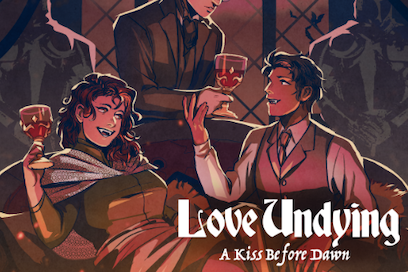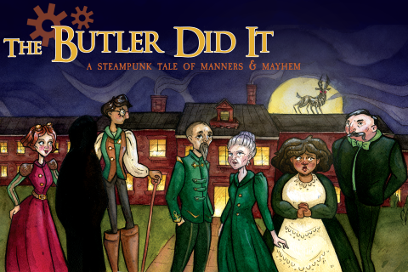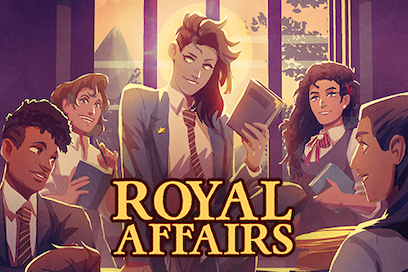Jun 10
2024
Author Interview—Lucas Zaper and Morton Newberry, “Unsupervised”
Posted by: K L | Comments (15)
Unsupervised is an interactive superpower novel by Lucas Zaper and Morton Newberry. We sat down with Lucas and Morton to talk about their work. Unsupervised releases this Thursday, June 13th. You can play the first three chapters for free today.
One of the really fun and distinctive aspects of your game is the idea that all of these heroes have left the hero-ing biz and all have day jobs. How did you go about building that world, where superpowers are both woven into society and closely regulated?
Lucas: You have all these sidekicks who suddenly found themselves without the guidance and protection of their mentors and have to face a worldwide escalation in supercriminal activity, increased scrutiny from regulatory agencies, and the mercurial nature of public opinion. All this while going through puberty.
So, some of them decided to use their powers for personal gain. Ghostling became a YouTuber specializing in haunted places, forging footage of the dead to make a living. Lil Biggie, now that he doesn’t have to answer to anyone, is following his dreams of becoming a rapper. And Multidude… well, I don’t want to give any spoilers, but he’s doing a lot.
Then there’s Flit, who’s trying to keep that Silver Age morality in an ever more cynical world, and the MC, who can be trying to do the same, acting more like a vigilante or being a downright villain. Or even, in perhaps the most evil choice of them all, become a politician.
We tried to make a world that feels real and self-consistent. There’s a timeline in the game that explains how the emergence of metahumans affected everything, from geopolitics to the cultural zeitgeist. Still, two clear examples that we can give are that we had a “cape race” instead of a “space race” during the Cold War, and that superhero comic books are a dying genre. Why read fictional stories on paper when you can watch the real thing live on TV?
(We took that idea from Watchmen, where pirates have replaced superheroes in comic books. In our case, it’s medieval fantasy.)
You’re both veteran ChoiceScript authors, with successful Hosted Games titles under your belts. What new challenges did you take on for this game?
Lucas: Having professionals giving feedback throughout the whole process is great. We had a rough start because we were so used to doing things our way–which meant an almost unreadable code for anyone that isn’t us–but I think we got the grip of it after the first couple of chapters. I want to thank everybody from CoG for their patience and for helping us get here.
Morton: The word count was a challenge in itself—Unsupervised is larger than any other story I’ve worked on. It’s bigger than Highlands, Deep Waters, The Vampire Regent, and Ghost Simulator. Also, as we wrote the scenes, the project changed substantially from the original outline. Looking back, I believe this deviation was a good thing, although it required a lot of flexibility and rewriting. And time.
How did you manage the co-writing process? What were the biggest difficulties? Did each of you gravitate towards a particular character or storyline?
Morton: We’ve been co-writing stories since 2016, and it’s been a challenging journey. I feel that our process has improved, but it invariably involves numerous rounds of feedback. And I guess it only works because we’re open and honest with each other. We don’t hesitate to say, “Man, what you wrote is really bad.” And then we throw it away and start again.
Our approach is to agree on main plotlines and story milestones, and then decide who’s going to write which scene. Then we write each scene individually and they go through rounds of feedback until we both find them acceptable. And this can take a while.
I think it’s natural that we gravitate towards particular characters and end up writing most of their scenes. That’s particularly true for ROs.
You’re both very active on our Forum and with fan engagement. How did fan reactions affect the development of the story?
Lucas: Comics taught me how to read; I’ve been reading them for over twenty-five years. I feel like I have a decent grasp on what superhero fans want from a game because I’m a fan myself, and I think when people read Unsupervised, they recognize that it is both a love letter to the genre and a hatemail to some of the industry’s practices.
If you ever got frustrated because a character wasn’t acting like they should, because of inconsistent power levels, or because a reboot or retcon invalidated something you held dear, you know what I’m talking about. But, by the end of the day, we fans only care so much about these characters and stories because we love them. And Unsupervised is, above all, a work of love.
So, my point here is that the story itself didn’t change much because we had a clear goal in mind: representing as many comic book tropes as possible and letting the players go wild. You can be Homelander if you want to, but you can also be All-Star Superman. We subvert some tropes, yes, but we also honor them.
Now, that doesn’t mean fans haven’t been essential in shaping the game. I can’t stress enough how much their feedback helped us with customization, balance, and bugfixing. In fact, I’d like to give a special shoutout to Denzil_Melgior_Nagel and Webtoonien, who probably have read the game more times than I have. There are others, too, but these two were relentless.
You’ve both talked openly about the process of finding bugs and bloopers during development. What was the funniest – or most frustrating – bug in Unsupervised?
Lucas: The game has a robust system for customizing your character’s superhero costume, allowing you to pick an item for each slot. I made various headgear, upper body gear, handwear, footwear, and capes, each with unique colors and the possibility of adding symbols.
But when we first made the demo public, I forgot to add lower-body gear. So it was like one of those recurrent nightmares where you suddenly find yourself wearing no pants in public. I always laugh when I remember it.
Morton: It isn’t a bug, but one scene in Vera City took at least four rewriting sessions to reach its final version. Oh, man.
Of course we have to ask: if you could have any of the superpowers mentioned in your game, which one would it be?
Lucas: People will always argue about which power is the strongest, and I’ve seen all kinds of different opinions on this. My favorite in the game is Enhanced Senses because you get so much new information and unique descriptions. But in real life, it would have to be Time Manipulation. There are just too many creative ways you can use it.
Morton: I love Miss Fortune’s power, Probability Manipulation. I used to play Mage: The Awakening with friends when I was younger, and I played an Acanthus character who could manipulate time and fate. I felt that this power would fit well in a superhero story like this one.








 Steam
Steam Twitter
Twitter Facebook
Facebook Tumblr
Tumblr RSS Feed
RSS Feed

